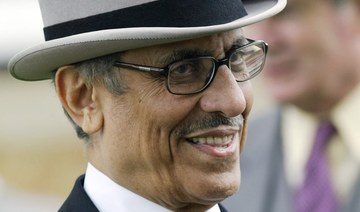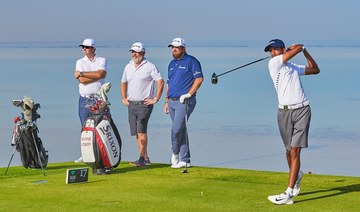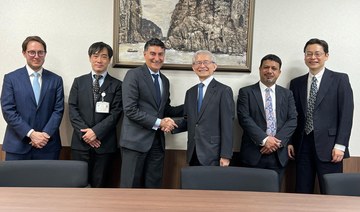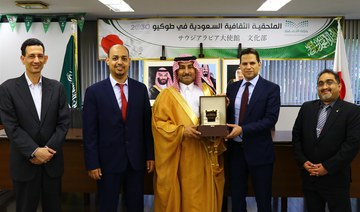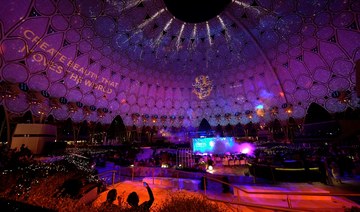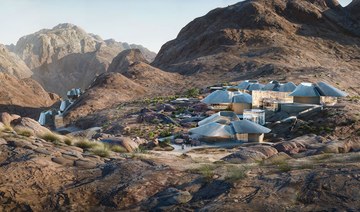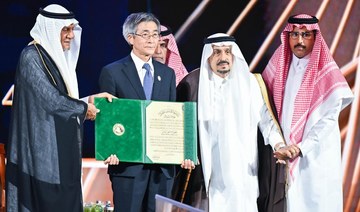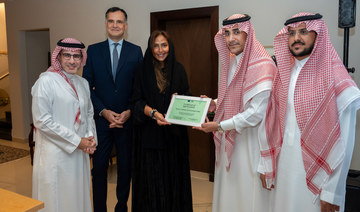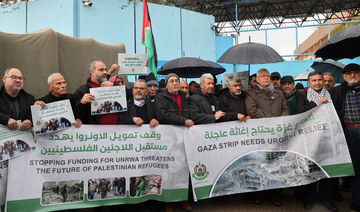MAKKAH: Darb Zubaida, or the Zubaida Trail, is one of the most important humanitarian and social projects of Islamic civilization. It stretches from Kufa, in Iraq, to Makkah, covering 420 kilometers inside the Kingdom alone, and was once known as a route for pilgrims and traders.
The trail was named after Zubaydah bin Jafar, wife of Caliph Harun Al-Rashid, who contributed to its construction and revival for convoys and passersby.
Ten days ago, more than 100 men and women took the initiative of reviving the Zubaida Trail, participating in a camel convoy along the historical path.
Turki Al-Muhaifer, one of the initiators, said that the project seeks to revive the heritage of the trail by charting it as it would have been in Zubaydah’s era.
“The road has an important historical dimension, which tells of a rich culture lived by our ancestors,” he told Arab News.
Al-Muhaifer explained that the road is valued for its vital role in connecting Iraq and Saudi Arabia and allowing pilgrims a passageway to Makkah to perform Umrah.
He noted that participants in the initiative started on Jan. 4 and will continue until Jan. 19, after traveling the 420 kilometers.
“We passed through several historical stops and through monuments that are still standing, despite the great passage of time,” he said.
Each day, the team wakes up early before the morning prayer. Following prayer, they have breakfast, get ready and then start off on the journey, stopping every 10 kilometers to rest. This continues until they stop for the night to sleep and repeat the process the next morning.
Thirteen nationalities were supposed to be represented in the convoy. Due to the exceptional circumstances created by the pandemic, however, that number was limited.
So far, the group has completed half the distance, traversing a variety of terrains, including rocky territory and sand.
“The project provides good lessons for youth and history lovers,” Al-Muhaifer said.
Fureih Al-Shamri, another member of the team, said that the main goal of the initiative is not so much to explore the Zubaida Trail as it is to shed light on this civilizational achievement, give the deserved historical and civilizational recognition to the place and encourage walking.
Al-Shamri said the unique experience was sure to delight lovers of history, archaeology, photography and the environment.
“Our goal is to allow them to practice their hobby and protect this historical heritage,” he said.
Another of the initiative’s goals is to show the world the Islamic civilization’s strong identity.
“This trail shows only a small part of the Islamic civilization and its wonderful legacy,” he said. “We are not only cameleers or shepherds, as we are portrayed in some Western media, but we are people with a rich and enduring legacy.
We had a civilization before petrol, and the Zubaida Trail is a testament to this. This road passes through stations, each containing wells and ponds. There were small markets, some of which were buried hundreds of years later, while others still exist.”
Sarah Al-Modaymagh, a businesswoman participating in the initiative, said that this is one of the most important experiences of her life. She described being part of a motivated group and traveling the Zubaida Trail as an enriching experience, encouraging physical fitness and promoting the study of culture and history.
“This initiative tells the story of a great lady who dedicated her life and effort to humanitarian and cultural work and managed to create a trail from Kufa to Makkah, despite the circumstances and hardships, in order to secure trade and Hajj routes,” she said.
She described the Zubaida Trail as a piece of “forgotten heritage” with an untold story and praised the initiative for bringing attention to it.
“It renews hope and sheds light on the story of a woman whose actions and foresightedness will last forever,” she said.
From Kufa to Makkah: Reliving the Zubaida Trail
https://arab.news/8wn5s
From Kufa to Makkah: Reliving the Zubaida Trail
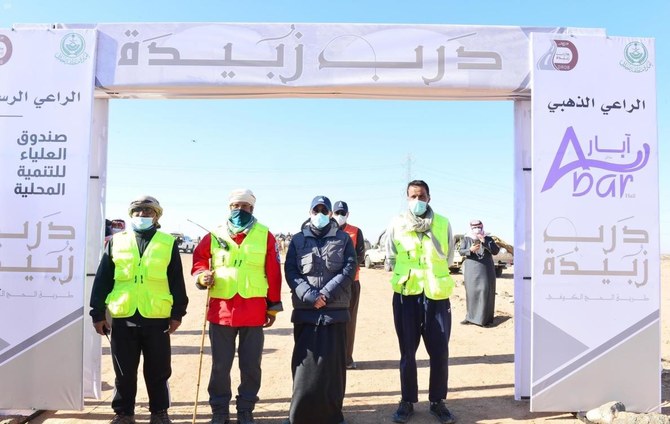
- The trail was named after Zubaydah bin Jafar, wife of Caliph Harun Al-Rashid
- Ten days ago, more than 100 men and women took the initiative of reviving the Zubaida Trail, participating in a camel convoy along the historical path
Japan, Saudi Arabia invite public to design 70th anniversary celebratory logo
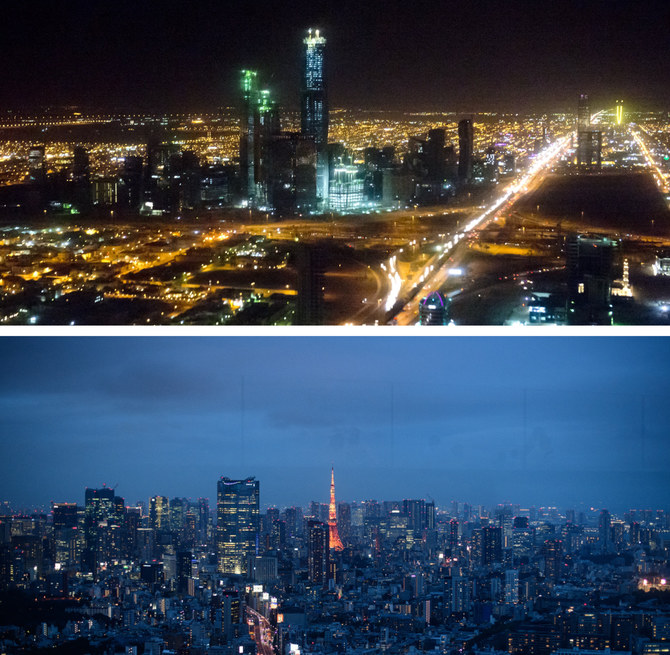
- The chosen logo will be used in all events commemorating the 70th anniversary of the two countries
- Anyone is eligible to apply to create a logo that conveys the strong ties between the Kingdom and Japan
The Japanese Ministry of Foreign Affairs has called for applications to design a logo to mark the 70th anniversary of the establishment of diplomatic relations between Japan and Saudi Arabia in 2025.
The chosen logo will be used in all events commemorating the 70th anniversary of the two countries.
Anyone is eligible to apply to create a logo that conveys the strong ties between the Kingdom and Japan.
The Ministry of Foreign Affairs of Japan, the Japanese embassy in Saudi Arabia, the Japanese consulate-general in Jeddah and the Saudi government will announce the best logo design on their websites and social media accounts.
The deadline for applications is June 10. Applications must be submitted as an email to [email protected].
Each logo design must be no larger than 3 MB in electronic format, with a resolution of 300 dpi or higher, in a file format — JPEG or PDF — that will fit an A4 size when printed.
An explanation of the purpose of the proposed logo mark is required with each submission.
A similar application was announced in 2021, when the UAE and Japan commemorated the 50th anniversary of establishing their diplomatic relationship.
More information on the applications can be found here: The 70th anniversary of the establishment of diplomatic relations between Japan and the Kingdom of Saudi Arabia in 2025 call for designs of the commemorative logo.
Saudi Arabia, Japan officials discuss investment ties
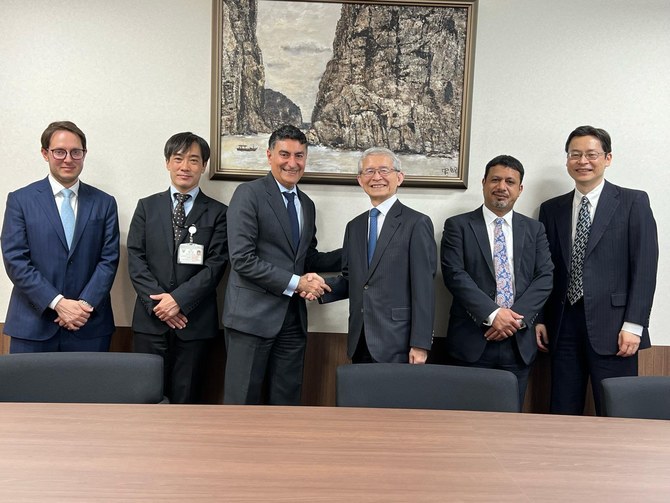
DUBAI: Saudi Arabia’s Ambassador to Japan Dr. Ghazi Binzagr met with Nobuyori Kodaira, chairman of the Japan Cooperation Center for the Middle East, on Thursday in Tokyo to discuss improving mutual investments.
The two officials highlighted the role that the JCCME plays in supporting Japan’s investments in Saudi Arabia, in sectors including healthcare, industry and entertainment.
The JCCME set up its regional headquarters in Riyadh in the 1990s. It now has an office in Dammam with an investment desk, while a water desk has been opened in Jeddah.
In 2018, the JCCME set up an investment-promotion scheme to fulfil the aims of the Saudi-Japan Vision 2030, within the framework of the Saudi Vision 2030 plan.
L’Oréal Middle East launches women upskilling project in Saudi Arabia
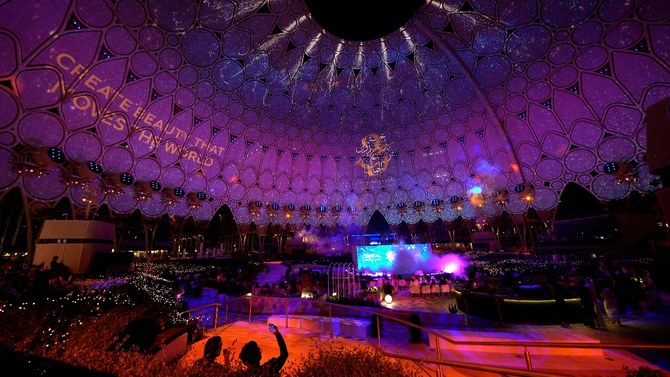
- L’Oreal Middle East inks pact with Kingdom’s Himayah Organization
- The initiative aims to help 600 women prepare for the workplace
DUBAI: As it celebrates its 25th anniversary, L’Oreal Middle East has signed an agreement with the Himayah Organization in Saudi Arabia to support its “Safe Homes” initiative, which seeks to provide skills training for more than 600 women.
“The project aims to have a lasting long-term impact through psychological support and skill training,” said Laurent Duffier, CEO of L’Oreal Middle East, in an interview with Arab News en Francais.
Over the past 25 years, L’Oreal has assisted 25,000 women in the region.
L’Oreal launched its Hairdressing Academy in Riyadh and Dammam in 2023, to upskill and integrate women in the workforce, recording a 70 percent employment rate in this growing beauty segment in Saudi Arabia. The program is expected to create 15,000 jobs for Saudi women.
The flagship “L’Oreal for Women in Science” program invested over $925,000 in endowments to support 51 female Arab scientists over the past decade and advocate for gender equality in STEM, or science, technology, engineering and mathematics.
In addition, the firm’s “Stand Up Against Street Harassment” project trained more than 11,000 participants on countering gender-based violence.

While the brand’s products have been distributed in the region since the 1960s, L’Oreal opened its first subsidiary in the Middle East in 1998, and currently serves 10 markets.
Today, the group is moving toward its 2030 sustainability, innovation and technology goals by engaging stakeholders across the supply chain, including consumers and startups, through strategic partnerships.
L’Oreal aims to foster innovation by investing in the startup ecosystem, the latest being the partnership with Astrolabs that launched the “L’Oreal Tech Quest Challenge” earlier in April 2024.
“The future is for beauty tech, tackling current industry challenges and augmenting the impact of L’Oreal’s solutions. ‘L’Oreal Tech Quest Challenge’ awarded a group of winners whose work will be incorporated in developing tools and best practices across the SAPMENA (South Asia Pacific - Middle East - North Africa) region,” said Duffier.
The region is home to a growing startup ecosystem. “LEAP in Saudi Arabia held in March reflects the growing entrepreneurial and creative energy in the Kingdom,” he added.
This is particularly important in the Middle East, where the beauty industry is recording one of the highest growth rates globally.
The GCC market ranks among the top 10 beauty markets worldwide, valued at $11.7 billion in 2024. Since the COVID-19 pandemic, the market has grown by 10 percent, fueled by underlying macroeconomic trends.
“Non-oil GDP in the GCC is growing at 4 to 5 percent while growing at less than 1 percent in Europe. The inflow of high-net-worth individuals had a positive impact on the luxury market in the UAE. While demand for beauty, particularly in Saudi Arabia, tripled during the last three years with the rise in women’s access to the workforce, and increase in disposable income,” said Duffier.
“The quality of retail execution, and the growth of new beauty concepts in the Kingdom, are factors boosting the market in the region, further enhanced by the growth in e-commerce,” he added.
According to a Boston Consulting Group report, in 2020 the Kingdom’s e-commerce share of total retail was 6 percent. This was far behind mature e-commerce markets and the worldwide average of 18 percent, but was 60 percent higher than the Kingdom’s 2019 share. It has been forecast that there will be double-digit growth post-COVID-19, with market value expected to exceed $13.3 billion by 2025.
“Saudi Arabia displays accelerated growth across segments. Efforts to diversify the economy are clear. It is the biggest economy in the region, with the highest potential, and it is a priority market for L’Oreal,” said Duffier.
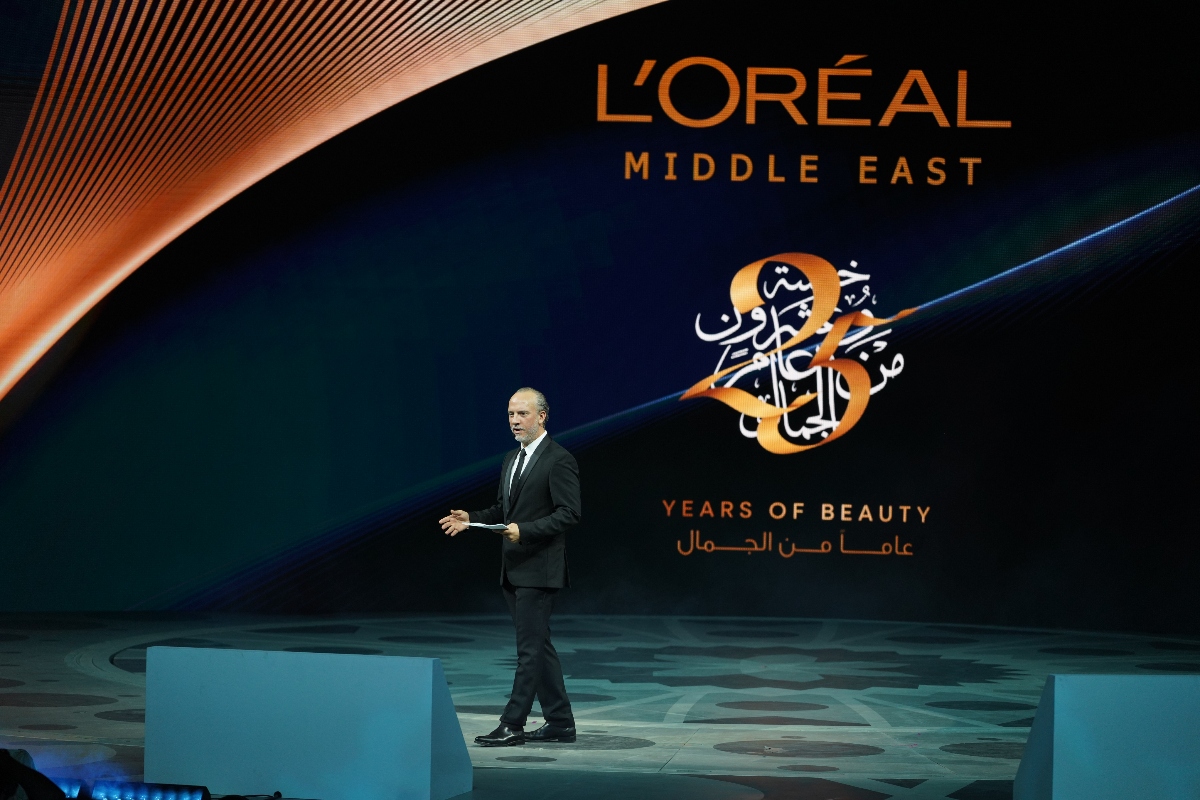
The offer-driven beauty and personal care market is expected to continue to be led by product innovation and beauty technology, for better end-user results, he said.
“We are launching Melasyl, after 18 years of R&D. A breakthrough ingredient for skin care treatments, among other applications,” said Duffier.
With lipstick used 5,000 years ago in Mesopotamia, Duffier describes the Middle East as the “cradle of beauty and a region that defines beauty trends.” The region has a diverse customer base, covering the full spectrum of skin and hair colors, is shifting toward digital platforms, and more sustainable consumption.
“We are working with startups to offer sustainable innovative products, with 70 percent of consumers opting for sustainable products,” said Duffier.
“We are no longer a beauty company, but a beauty tech company. Anchored in innovation and sustainability, the objective remains beauty for all. The future of beauty will be increasingly personalized to create beauty that moves the world, and most importantly to create beauty that moves the Middle East,” he said.
The quest for sustainability is also a byproduct of the reconciliation between beauty and tech, developed and implemented across the various segments: hair care (Airlight pro), derma cosmetics, the latest being La Roche-Posay’s diagnostic virtual reality tools, and make-up applications in collaboration with Microsoft.
“By applying green science, 95 percent of products’ ingredients will be bio-based and traceable to natural green-science formulations by 2030,” he said.
Advancing toward its sustainability targets, the “L’Oreal for the Future” program aims to reduce carbon dioxide emissions at all sites, and move to renewables, waste management and water treatment by 2030.
L’Oreal Middle East expects a 50 percent reduction in distribution-related carbon dioxide emissions, and a 70 percent reduction in water consumption with the introduction of Gjosa shower heads in hair salons.
Set to launch in the region this year, the latter is expected to target 500 salons per year, for a total yearly saving of 35 million gallons of water.
This is in addition to the recycling of 340 tonnes of waste over the past two years in Saudi Arabia, which is a Garnier initiative in collaboration with Panda and Naqaa Solutions.
Saudi cultural attache in Japan receives Jeddah University delegation
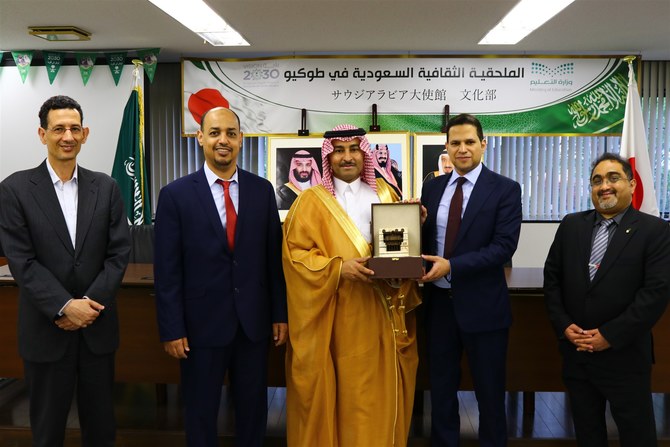
DUBAI: Saudi Arabia’s cultural attache in Japan hosted on Thursday a delegation from Jeddah University, led by the institution’s Vice President for Academic Affairs and Development Dr. Monagi bin Hassan Al-Kanaani.
Dr. Anas Ahmed, Jeddah University’s dean of the College of Engineering, and Dr. Mohammed Kalkatawi, director of the Data Management Office at the institution, were part of the delegation.
زار الملحقية الثقافية السعودية في #اليابان وفداً من #جامعة_جدة يرأسهم سعادة د. مناجي بن حسن الكناني وكيل الجامعة للشؤون الأكاديمية والتطوير ويرافقه سعادة د. أنس أحمد عميد كلية الهندسة و د. محمد كلكتاوي مدير مكتب إدارة البيانات بالجامعة خلال زيارتهم لليابان. pic.twitter.com/Cw72aLimXL
— الملحقية الثقافية السعودية في اليابان (@SaudiCultureJP) April 25, 2024
Badr Al-Otaibi, director of the office of the Saudi Arabia cultural attache in Japan, received the delegation.
The officials discussed their visits to several Japanese universities to explore cooperation opportunities and sign student-exchange agreements.
Saudi Arabia welcomes independent committee’s report on UNRWA’s performance
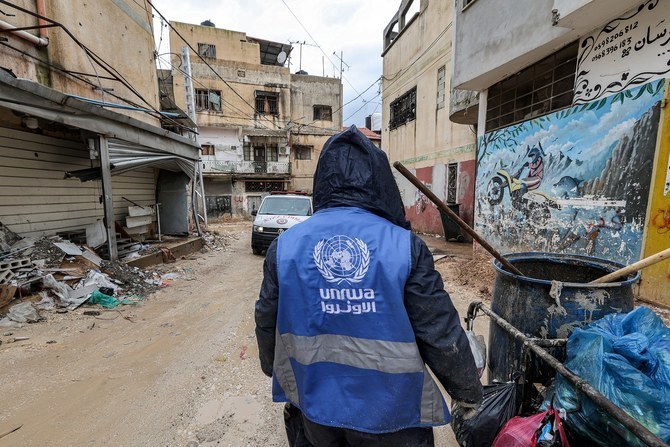
- Saudi Ministry of Foreign Affairs stresses importance of the commitment of donor countries to the organization
RIYADH: Saudi Arabia has welcomed an independent committee’s report on the performance of the UN Relief and Works Agency for Palestine Refugees, the Saudi Press Agency reported on Wednesday.
The Saudi Ministry of Foreign Affairs said the Kingdom backed the report, which confirmed UNRWA’s main role in supporting the relief, humanitarian and developmental efforts of the Palestinian people.
The ministry further reiterated Saudi Arabia’s emphasis on the importance of the commitment of donor countries to UNRWA to ensure the sustainability and effectiveness of all forms of support for refugees in a way that reduces their suffering, especially in light of the Israeli occupation’s continued violations of international law and international humanitarian law.






